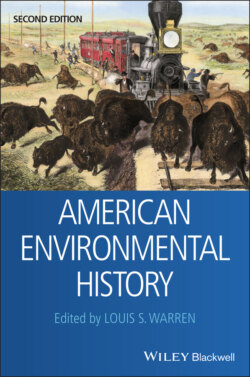Читать книгу American Environmental History - Группа авторов - Страница 63
Spanish Priests Joseph Antonio Murguía and Thomaís de la Peña Explain Indian Frustration with Settler Livestock in Colonial California
Оглавление(Excerpt from Writings of Junípero Serra, ed. Antonine Tibesar, vol. 4. Washington, DC: Academy of American Franciscan History, 1966.)
The final document in this section (dated 1782) takes us across the continent to the Spanish colony on the West Coast of North America, in the area that eventually became the state of California. Here, Catholic priests were in charge of converting Indians to Christianity and, to some degree, protecting them from the predations of other Spanish settlers, especially soldiers. Indians were settled at mission complexes, where priests oversaw their education as farmers. (Unlike Indian peoples in New England, California Indians for the most part did not farm prior to the arrival of the Spanish, but instead made a very good living from gathering wild foodstuffs and hunting.)
In this document, two priests explain to their superior how Indians in their region are becoming increasingly angry about the ways in which settler livestock and settler encroachments on their land are making their lives more difficult at the mission. They appeal for the colonial settlement to be removed. The letter mentions a “reduction,” the term for placing Indians in a mission. The letter also refers to “gentiles,” Indians who lived outside of missions, in traditional villages. Did settler possession of livestock in California make peaceful relations with Indians less likely? Was livestock, in some sense, a weapon for the dispossession of Indians?
Reverend Father President Fray Junípero Serra.Venerable Father in Christ and Sir:
Over and above the fact that the land belongs to the Indians since they were born on it – they, and their fathers and forebears – and have for generations lived on the berries in the woods, which they gathered in proper season; in addition, there is the fact that His Majesty distinctly lays down in Law 9, Book 6, Section 1, as found in the Nueva Recopilacioín, that they should still retain possession of it just as before the reduction. Furthermore, His Majesty similarly decrees in Law 8, Section 3, Book 6 that wherever sites are located for pueblos or reductions, they should be provided with the conveniences of water, land, mountains, entrances and exits, and tillage land and common land for a full league around, suitable for the Indians to pasture their flocks, and that this should not be mixed up with others belonging to Spaniards….
Now the townspeople here under discussion have, as everyone knows, quantities of livestock, both large and small. And recent history has shown that, besides getting mixed up with the livestock belonging to the Indians from the mission, the animals, both large and small, belonging to the townsfolk have caused unceasing damage to the crops put in by the Indians. Now all this took place before they were in formal possession even of the land on this side of the river – and the boundary line comes right up to the ground which the Indians have placed under cultivation – it is evident that the damages – and nobody can deny it – will be far greater. The consequence will be, perhaps, that the Indians will have to stop their field work, so as not to labor in vain; and they will have to rely for their food on the herbs and acorns they pick in the woods – just as they used to do before we came. This source of food supply, we might add, is now scarcer than it used to be, owing to the cattle; and many a time the gentiles living in the direction of the pueblo have complained to us about it….
Kissing the hand of Your Reverence, Your devoted subjects and servants, Fray Joseph Antonio Murguía Fray Thomás de la Peña
